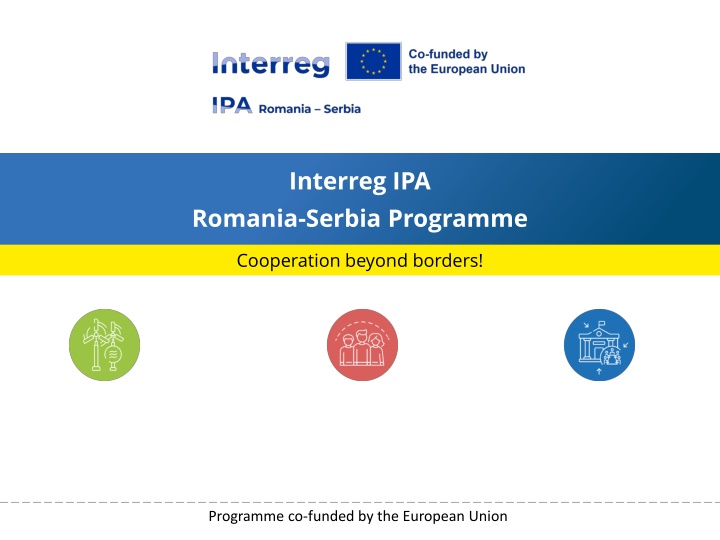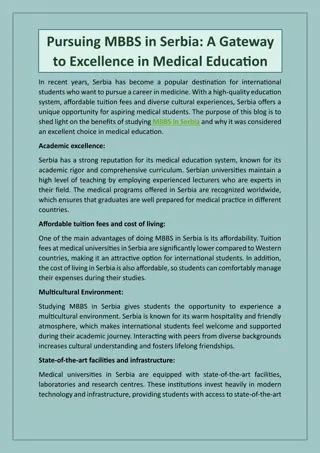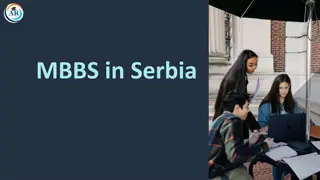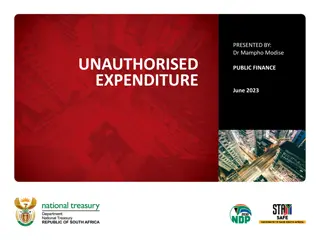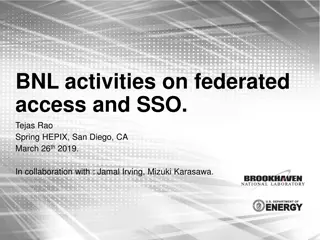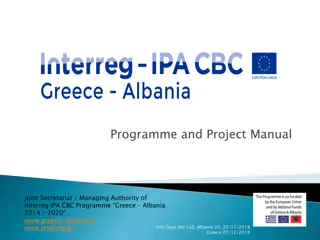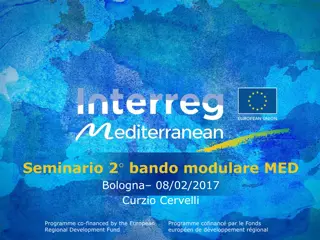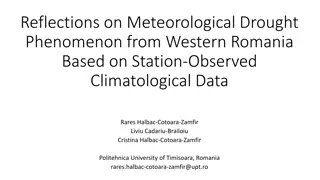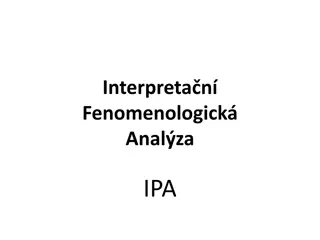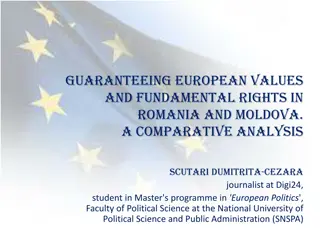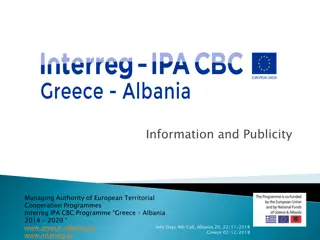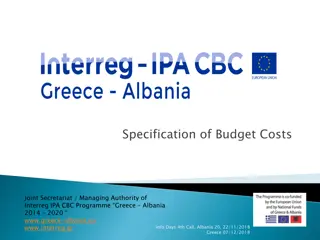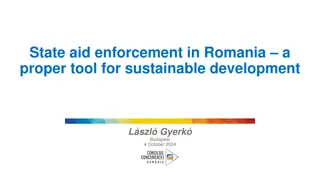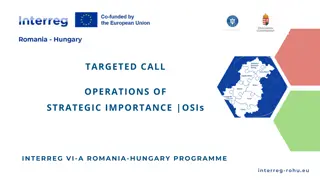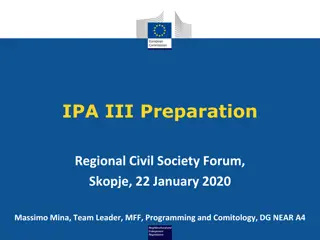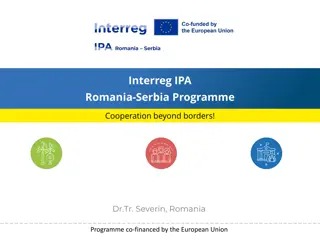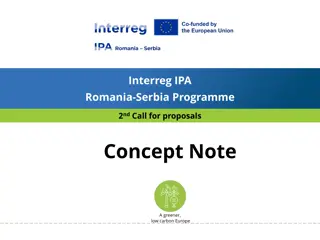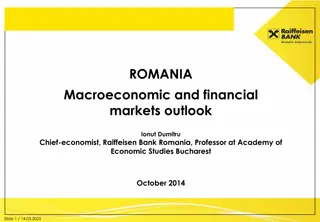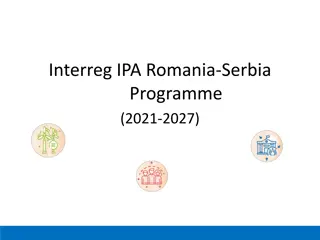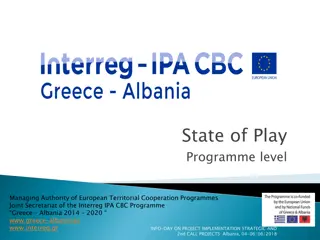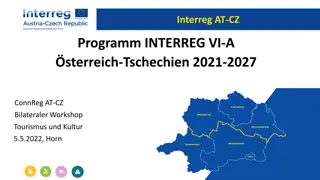Eligibility of Expenditure under Interreg IPA Romania-Serbia Programme
Expenditure under the Interreg IPA Romania-Serbia Programme is eligible if it meets specific criteria outlined in the subsidy contract, co-financing contracts, and European legislation. Costs must be necessary for project implementation and comply with financial management principles. Additionally, all expenses should be transparent, non-discriminatory, and in line with the programme's rules. The beneficiary must ensure that expenditures are properly recorded, verifiable, and backed by supporting documents. Double-funding is not permitted, and in-kind contributions are ineligible. Verification by designated controllers is required for Romanian and Serbian beneficiaries.
Download Presentation

Please find below an Image/Link to download the presentation.
The content on the website is provided AS IS for your information and personal use only. It may not be sold, licensed, or shared on other websites without obtaining consent from the author.If you encounter any issues during the download, it is possible that the publisher has removed the file from their server.
You are allowed to download the files provided on this website for personal or commercial use, subject to the condition that they are used lawfully. All files are the property of their respective owners.
The content on the website is provided AS IS for your information and personal use only. It may not be sold, licensed, or shared on other websites without obtaining consent from the author.
E N D
Presentation Transcript
Interreg IPA Romania-Serbia Programme Cooperation beyond borders! Programme co-funded by the European Union
Eligibility of expenditure Expenditure under Interreg IPA Romania-Serbia programme is considered eligible if: is deemed necessary for initiating and carrying out the project and complies with the principles of sound financial management, in particular value for money and cost-effectiveness. is in line with the provisions of the subsidy contract, co-financing contracts, European legislation. the costs are definitively borne by the beneficiary and would not have arisen without the project. applicable national and
Eligibility of expenditure Expenditure under Interreg IPA Romania-Serbia programme is considered eligible if: all costs are subject to Programme applicable rules and procedures and ensure that all contracts comply with the basic principles of transparency, non- discrimination and equal treatment. for projects where total costs exceed EUR 100.000, each partner of an Interreg project must display durable plaques or billboards clearly visible to the public, presenting the emblem of the Union. no double-funding is permissible.
Eligibility of expenditure Expenditure under Interreg IPA Romania-Serbia programme is considered eligible if: is committed by the beneficiary after the entry into force of the subsidy contract and before the end of the implementation period of the operation. paid during 1 month after the implementation period at the latest. end of the they are necessary for the operation and are stipulated in the budget of the operation.
Eligibility of expenditure Expenditure under Interreg IPA Romania-Serbia programme is considered eligible if: the expenditure has actually been paid out. is recorded in the beneficiaries accounts and tax documents, is identifiable and verifiable, and is backed up by supporting documents. has Programme s relevant publicprocurementrules. been incurred with the observance of
Eligibility of expenditure Expenditure under Interreg IPA Romania-Serbia programme is considered eligible if: is verified and validated as eligible by the designated controllers for Romanian and Serbian beneficiaries; has not been subject to financing from other public funds; in-kind contributions are not eligible under the Programme.
Eligibility of expenditure Expenditure categories: a) b) c) d) e) f) g) Staff costs; Office and administration expenditure; Travel and accommodation costs; External expertise and services costs; Equipment expenditure; Infrastructure and works; Expenditure related to activities outside the Programme area. Costs under d, e, f, g are eligible if incurred in accordance with public procurement rules relevant for the beneficiaries under the Programme.
Project preparation costs Use of simplified cost option: Project preparation lump sum 13,500 euro (IPA), at the project level, for project preparation expenditures for infrastructure investment projects; 10,000 euro (IPA), at the project level, for project preparation expenditures for equipment investment projects. Beneficiaries will be granted the lump sum by MA for project preparation after the subsidy contract is signed by the last party. No checks will be performed, the output on which the project preparation sum is granted is the signed subsidy contract.
Project preparation costs Use of simplified cost option: Types of expenditures covered Travel and accommodation costs related to meetings between project beneficiaries; External expertise and services; Feasibility study or equivalent technical documents, Cost Benefit Analysis, studies and costs for documentation necessary to obtain the necessary endorsements and authorizations, documentation concerning the urban planning, impact assessments, location studies/appraisals, including their technical verification, market analysis, fees in accordance with the national legislation.
Staff costs Use of simplified cost option: Staff costs shall be reimbursed as a flat rate up to 20 % of the direct costs other than the direct staff costs, at partner level Staff costs cover costs of staff members employed by the partner organisation who are directly working on the project All indirect staff costs must be budgeted under Office and administration No management verification will be performed
Staff costs Use of simplified cost option: Expenditure on staff costs shall consist of gross employment costs of staff employed by the beneficiary in one of the following ways: full time; part-time with a fixed percentage of time worked per month; part-time with a flexible number of hours worked per month; on an hourly basis.
Staff costs Use of simplified cost option: Expenditure on staff costs shall be limited to the following: (a) salary payments related to the activities which the entity would not carry out if the operation concerned was not undertaken, fixed in an employment/work contract, an appointment decision (both hereinafter referred to as employmentdocument ) or by law, relating to responsibilities specified in the job description of the staff member concerned;
Staff costs Use of simplified cost option: (b) any other costs directly linked to salary payments incurred and paid by the employer, such as employment taxes and social security including pensions provided that they are: fixed in an employment document or by law; in accordance with the legislation referred to in the employment document and with standard practices in the country and/or organisation where the individual staff member is actually working; not recoverable by the employer.
Office and administrative expenditure Use of simplified cost option: flat rate of 7% of eligible direct costs of the project, at partner level Office rent; Insurance and taxes related to the buildings where the staff is located and to the equipment of the office (e.g. fire, theft insurance); Utilities (e.g. electricity, heating, water); Office supplies; Accounting (e.g accountant of the organization);
Office and administrative expenditure Use of simplified cost option: Archives; Maintenance, cleaning and repairs; Security; IT systems; Communication (e.g. telephone, fax, internet, postal services, business cards); Bank charges for opening and administering the account or accounts where the implementation of an operation requires a separate account to be opened; Charges for transnational financial transactions.
Travel and accomodation costs Use of simplified cost option: flat rate up to 15% of the direct staff costs of the project, at partner level travel costs (e.g. tickets, travel and car insurance, fuel, car mileage, toll and parking fees); the costs of meals; accommodation costs; visa costs; daily allowances.
External expertise and services costs should be based on contracts or written agreements concluded with external experts and service providers, and paid based on invoices or equivalent requests for reimbursement, should be provided by a public or private law body or a natural person other than the beneficiary and all partners of the operation,
External expertise and services costs Studies or surveys (e.g. evaluations, strategies, concept notes, design plans, handbooks); Training; Translations; Development, modifications and updates to IT systems and website; Promotion, communication, publicity, promotional items and activities or information (including publications) linked to an operation or to the Interreg IPA Romania - Serbia programme as such;
External expertise and services costs Financial management; Services implementation of events or meetings (including rent, catering or interpretation); Participation in events (e.g. registration fees); Legal consultancy and notarial services, technical and financial expertise, other consultancy and accountancy services; Intellectual property rights; related to the organisation and
External expertise and services costs The provision of guarantees by a bank or other financial institution where required by Union or national law or in a programming document adopted by the Monitoring Committee; Travel and accommodation for external experts, guests, speakers, chairpersons of meetings and service providers; Other specific expertise and services needed for operations.
Equipment costs Expenditure for the financing of equipment purchased, rented or leased shall be limited to the following: Office equipment; IT hardware and software; Furniture and fittings; Laboratory equipment; Machines and instruments; Tools or devices; Vehicles; Other specific equipment needed for operations.
Costs for infrastructure and works Costs for infrastructure and works shall be limited to the following: purchase of land in accordance with point (b) of Article 64(1) of Regulation (EU) 2021/1060; building permits; building material; labour; specialised interventions (e.g. soil remediation, mine-clearing).
Costs for infrastructure and works Purchase of land cannot exceed 10% of the total eligible expenditure of the project. In the case of derelict sites and sites formerly in industrial use (also known as brownfields ) which comprise buildings, the purchase price cannot exceed 15% of the total eligible expenditure. (Article 64(1)(b) CPR). All costs related to fulfilment of all compulsory requirements should be included in the external expertise and services cost category, unless they are part of an infrastructure contract.
Costs for infrastructure and works Within 5 years of the final payment to the beneficiary, a project cannot: a cessation or transfer of a productive activity outside the NUTS level 2 region in which it received support; change ownership of any piece of infrastructure which gives an undue advantage to a firm or a public body; substantially change implementation conditions which would result in undermining its original objectives. its nature, objectives or
Project closure costs Use of simplified cost option: Project closure costs shall be reimbursed as a lump sum of 3,000 euro (IPA), at project level. Staff costs; External expertise. Beneficiaries will be automatically granted the lump sum for project closure, by MA, after the approval of the final project report, reimbursement of the final reimbursement claim. together with the
Expenditure related to activities outside the programme area As a general rule, activities for which funding is sought, have to be carried out in the area of the programme As an exception, a part of an operation may be implemented outside the programme area but within the territory of the countries participating to the Programme, provided that the activities contribute to the objectivesof the Programme and are in the benefit of the Programme area.
Non-eligible expenditure fines, financial penalties and expenditure on legal disputes and litigation; costs of gifts; costs related to fluctuation of foreign exchange rate; interest on debt, except in relation to grants given in the form of an interest rate subsidy or guarantee fee subsidy;
Non-eligible expenditure the purchase of land for an amount exceeding 10% of the total eligible expenditure for the operation concerned; for derelict sites and for those formerly in industrial use which comprise buildings, that limit shall be increased to 15%. This point shall not apply to operations concerning conservation; value added tax (VAT) except where it is non- recoverable under national VAT legislation. environmental
New elements Projects must dedicate at least 50% of their budget to investment activities: works, infrastructure, non-removable installations, fixed and intangible assets, new or renovated building, equipment and software, investments in access to services; The extended use of simplified costs options for the following eligible expenditures: Project preparation lump sum; Staff costs flat rate; Travel & accomodation flate rate; Office & administrative costs flate rate; Project closure lump sum.
Project application The application process shall be done through the Programme s Electronic Monitoring System (JEMS). Deadline for submission: 01.02.2023 16:00, Romanian local time The Programme s Electronic Monitoring System is accessible at the following web address: https://jems-rors.mdlpa.ro Helpdesk: E-mail: helpdesk@brct-timisoara.ro Telephone: +40 356 42 63 60 Fax: +40 356 42 63 61
